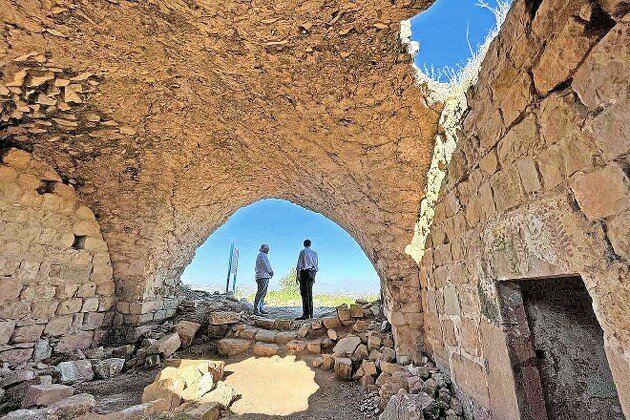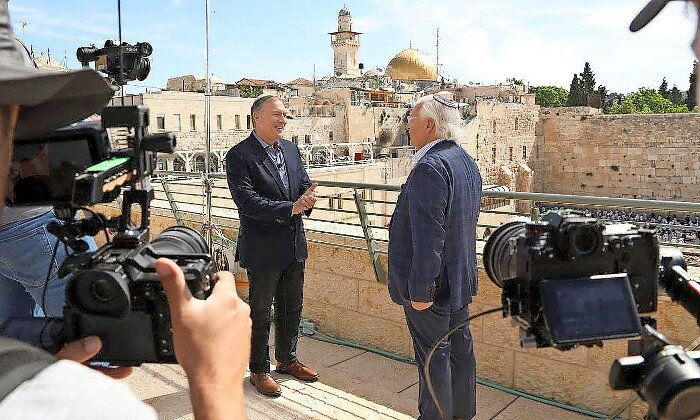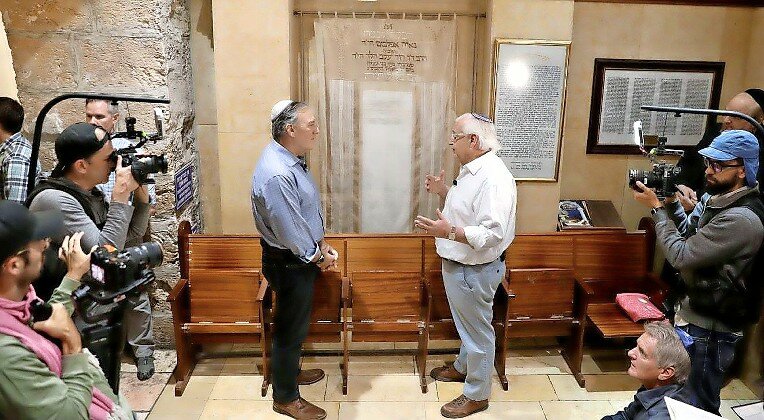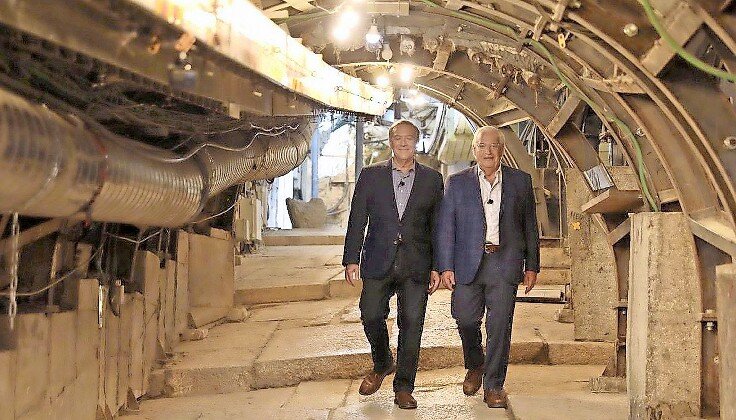‘Rte 60’: Love story to the land of Israel
The political achievements in the Middle East of two of America’s most impactful diplomats, former Secretary of State Mike Pompeo and former Ambassador to Israel David Friedman, were rooted in their strong faith in G-d and the values imbued by the mystical stories of the Bible.
Now both out of politics, the diplomatic duo has teamed up once again to document some of their key geopolitical triumphs and the motivational religious underpinnings that guided them, while filming a tour of Israel’s most sacred sites.
“Route 60: Israel’s Biblical Highway” is a trek down the road that runs through the center of modern Israel. The 146-mile highway connects several cities fundamental to both Judaism and Christianity, including Jerusalem, Hebron, Beit El, Shiloh, Beersheva, Bethlehem and Nazareth.
The unscripted tour was filmed over a four-day period by Friedman, an observant Jew, and Pompeo, a devout Christian. As Friedman says in the film’s opening: “Route 60 connects many holy sites and biblical events in what could be called the original Bible Belt. It has mile markers, human and divine, to memorialize the acts of celebration, suffering and salvation that are woven into Israel’s history.”
Most of the sites toured are located in the biblical provinces of Judea and Samaria, commonly referred to by many around the world as the West Bank. While many recognize the province for its millennia-old biblical importance, today many view the contested parcel only through the prism of a decades-old Israeli-Palestinian conflict.
“I want people to care about Judea and Samaria,” Friedman told JNS. “I want them to stop thinking about it as some part of the world that is distant and removed from them, that doesn’t matter, that’s just a piece of territory that’s subject to violence or subject to disputes or subject to claims of legality or illegality.”
“There is a lot of apathy and a lot of ignorance about many of these places,” he added.
For example, in the film, Friedman asks Pompeo, “How big do you think the entire Old City of Jerusalem is?” before answering, “one square kilometer [approximately 6/10 of a mile]. That’s it.”
To which Pompeo replies: That’s “a lot of history in that little space. Per square foot it’s got the most history anywhere in the world.”
For most tourists, many of the locations Friedman and Pompeo traveled to are either rarely visited or off-limits. A trip to the original and intact altar of Joshua required military clearance, for example. For viewers, “Route 60” is likely to provide an exclusive first look into the sites they read about in scripture.
“The thinking was that if people can’t go, then we can make a movie and show people what’s there,” Friedman explained. “I wanted people to understand that while Israel is commonly referred to as the Land of the Bible, most of the stories of the Bible take place in Judea and Samaria. A place where incredibly, most of the world doesn’t think Israel has the right to be.
“This ability to really experience these sites in a peaceful and inspiring way is very much an outgrowth of the policies of the Israeli government since 1948. It’s really only been Israel that has made it a priority to make all those holy sites of each faith accessible Jews, Christians and Muslims.
“That was not the case before 1948, and I think that Israel is justifiably very proud of how they’ve been a good custodian of the holy sites of all three major faiths.”
And though much of the film deals with sites in the world’s most hotly contested territory, Friedman and Pompeo mostly try to steer clear of controversial themes.
“It’s not political in nature. It doesn’t advocate any specific resolution to the Israeli-Palestinian conflict,” said Friedman. “The events of the Bible live on this road. And I’m willing to gamble on the fact that when people understand that better, we will break the apathy and people will care about it more. And once they care about it more, I think I’m much more confident that we’ll get to the right outcome with regard to the long-term treatment of this territory,” he added.
In the film, Pompeo shares key episodes from his term as Secretary of State, including freeing American hostages in North Korea and reversing a decades-old American policy that viewed suburban Jewish settlements as inherently illegal. The film retells the story of moving America’s embassy from Tel Aviv to Jerusalem and the signing of the historic U.S.-brokered Abraham Accords between Israel, the United Arab Emirates and Bahrain.
Part of the film’s unique nature stems from the fact that the tour is unscripted, and as a result at times gets very personal. In addition to explaining the history and deep meaning of each location for millions around the world, both share very intimate stories. Friedman for example shares the connection of Rachel’s Tomb in Bethlehem to his cousin’s fiancé, who along with her father was murdered in a Jerusalem terror attack on the eve of her wedding. Her unworn wedding dress was recut into a curtain that covers part of the tomb.
When one of the two tour guides shared a story, the other was right there to match the emotion with a story of their own.
“It was very inspiring for me, and I hope for Mike as well, because I think we got a chance to see firsthand each other’s reactions to these places. And we’re coming from different theological perspectives, but I think those differences were very blurred. I think we each appreciated the great historical significance,” said Friedman. “So we were both very enthusiastic and energized by it. And I think it comes across on camera.”
Matt Crouch, the president of Trinity Broadcasting Network (TBN) and an executive producer of the documentary, told JNS that the film only coalesced “because of the way David and Mike clicked on camera and matched each other’s energies.”
“This story is told by two guys who can give a better biblical and geopolitical presentation on these places than anybody else,” Crouch added. He noted that while he has been to Israel “100 times or more,” on this trip he got to visit “eight to 10 places I have never been before.”
“With no travel required, viewers are getting a look at the ancient roadway that Abraham and other biblical heroes took,” he said.
While the feature-length film is 90 minutes, Crouch added that there are nearly five hours of footage that will be aired as a four-part series on TBN in the months after the film’s theatrical release.
The film premieres in over 1,000 theaters across the United States on Sept. 18 and 19.
Friedman noted that “TBN — the resources they brought to bear, the quality of the filmmakers, the people doing the editing, the number of cameras. … I’m telling you, every stop along the way was a different group of equipment and professionals doing the filming. That’s a lot of resources. TBN really wanted to do it right, and they put everything they had into it.”
As an Orthodox Jew, Friedman told JNS that he had no problem visiting sites considered holy to Christians and creating a documentary that is likely to be viewed by far more Christians than Jews.
“As I’ve worked on this film and spoken about it to many people who I know of the Christian faith, I’ve been tremendously encouraged by how deeply they care about the biblical integrity of the State of Israel. It gave me a lot of strength,” said Friedman.
“If the result of the movie is that Christians are enthused about connecting to the Christian sites, I think that the film is a big success. I think that I want Christians to find as much meaning and purpose and value in the film, and of course in the underlying locations, as a Jew would find with regard to the parts that are meaningful to a Jew,” he added. “Again, let’s just point out that to the Christian world, which sees great holiness in the Old Testament and the prophets, virtually everything that I experienced as a Jew is relevant and inspiring as well.”
Pompeo notes at the end of the film, “When I first was introduced to this project I remember thinking: ‘That’s going to be hard, these are difficult places to get [to], it’s going to take multiple government approvals.’ And I think when I look back on this project now and I see the beauty of the project and the glory of the work we did, it was all worth it.
“It was a labor of love, and I pray that this documentary will help others in the same way that it did me, to come to know the Bible as real, as foundational. I touched it. I was there. I walked up to it. It’s physically just as the Bible was written, and all the work is worth it when you can share that with others.”













